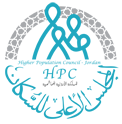

The Higher Population Council and Share-Net project launched the results"Strengthening private sector participation in the provision of reproductive and sexual health services in Jordan" study during the meeting held on Sunday with the participation of representatives of relevant national agencies.
The Assistant Secretary-General of the Higher Population Council, Rania Al-Abbadi, in a speech delivered on behalf of the Secretary-General of the Higher Population Council, Dr. Abla Amawi, confirmed that the meeting was based on the Council's role as a reference point for population and development issues, its interest in updating and developing population and development data and information, the proposal for population policies based on global evidence, Jordan's commitment to implement the the International Conference on Population and Development in Cairo 1994, the commitments of the NAIROBI Summit and sustainable development agenda 2030, in line with sustainable development third goal "Ensure that all people enjoy healthy lifestyles and well-being at all ages and that everyone has the right to the enjoyment of the highest attainable standard of physical and mental health"The Board had taken it upon itself to prepare this policy study and summary. "Strengthening private sector participation in the provision of sexual and reproductive health services in Jordan"To identify policy, legislative and strategic constraints and identify challenges facing the profit-making private sector, with a view to enhancing the participation of the role of the sector in the delivery of sexual and reproductive health services.
The aim of the study is to analyse the situation of reproductive health services in the private sector in terms of the health policies that govern their work and the services and their quality, the coverage size, the human resources involved and the extent to which services reach the target groups, and to identify the catalysts, current experiences and obstacles facing the private sector in determining its commitment to implementing reproductive and sexual health initiatives and programmes and contributing to the sustainability of services and comprehensive development as a supportive partner of the government sector, in addition to identifying mechanisms and methodologies for partnership and collaboration between the private sector, the government sector and other sectors with regard to improving the policy environment, the identification and quality of services and the basis for implementing reproductive and sexual health programmes to promote and achieve development goals and improve health output in Jordan, as well as proposing scientific-based health models to strengthen the partnership between the private-profit sector and the government sector in achieving reproductive health goals in Jordan that respond to global variables and emergency health conditions.
Al-Abbadi pointed out that the study highlighted the obstacles and gaps facing the active role of the private sector in the provision of sexual and reproductive services and the obstacles to partnership between the Government and the private sector in several aspects, including regulatory legislation, financial constraints, barriers to confidence between the sectors, and obstacles to services and information.
The study concluded with a series of proposals to strengthen the public-private health sector partnership in the delivery of reproductive and sexual health services, including the creation of an independent health sector regulatory body within a common reference, the preparation of a comprehensive national study on the extent of the private sector's contribution to the delivery of reproductive and sexual health services, their components and the quality of services provided, and the Preparation of the comprehensive health insurance system for all groups within packages of services covered by health insurance. Beneficiaries choose the entity and services that they wish to offer. Inclusion of family planning methods in the services of private health insurance companies. Raising awareness among legislators of the importance of public-private partnership and government support for universal health coverage to achieve justice. The establishment of a national health information centre, to be hosted by the Ministry of Health, is mandatory for all sectors. This requires an amendment to the Public Health Act and the preparation of regulations and instructions for the establishment of the centre, defining the mandatory and the tasks assigned to all sectors.
The study proposed three models for strengthening public-private partnership that were built on the results of the analysis of global best practices in relation to partnership models and the results of the survey of decision makers, researchers and practitioners in both the public and private sectors participating in the study, as well as the results of the national workshop held with the aim of learning and adopting the results of the study, taking into account their response to the needs of target groups for reproductive and sexual health services. These models provide multiple options for institutions working in the public and private health sector to match the nature of their work, objectives and objectives of the partnership.
The first proposed model consist service quality and comprises three models (procurement of services, continuing and dependent medical education, universal health coverage/universal health insurance). The second model is the community responsibility of private sector enterprises, which are included as social responsibility programmes. Private-profit enterprises tend to review their roles and responsibilities beyond purely profitable activities to support programmes that offer social, economic or health benefits with a view to improving the reputation of the enterprise and helping it enter new markets by building valuable infrastructure and expanding contacts.
The third model is commercial (marketing-based), which involves encouraging the commercial sector, especially pharmacies and pharmaceutical warehouses, to accept lower profit swaps for reproductive and sexual health services, especially family planning, in exchange for growth and profit through market expansion. The profit-making business sector collaborates with the public sector to enhance social impact. The model is maintained through profit generation.
On the sidelines of the launch, a discussion session was held, which was conducted by the Director of the Studies and Policy Unit of the Supreme Council of the Population Ali Almutliq, with the participation of representatives of the private sector, the Ministry of Health, a representative of the voluntary sector and a representative of the Higher Health Council.







